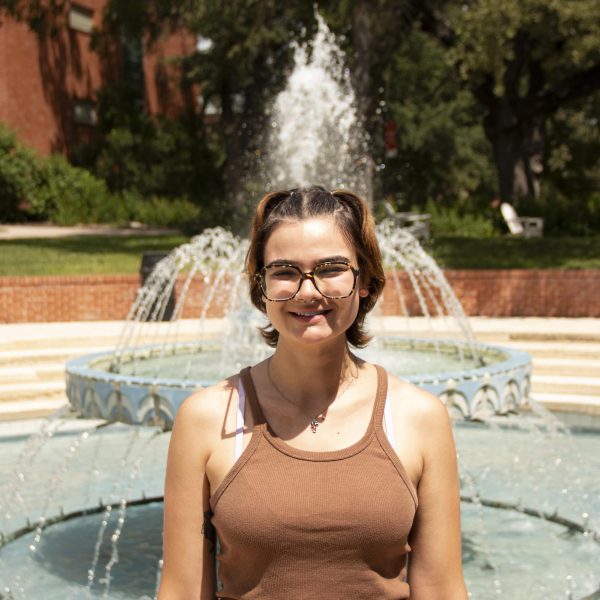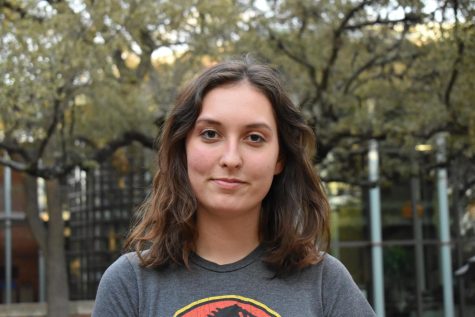ASL club works toward gaining language credit
American Sign Language club collects support across campus in fight for language credit
Since the beginning of the semester, officers of the American Sign Language (ASL) club at Trinity have been working with administration to accept credit from ASL classes taken in high school or at other universities and to possibly implement an ASL course at Trinity. The process is still in its initial stages, but support across campus is ramping up.
The initiative began when Sydney Crowther, senior psychology major and president of Trinity’s ASL club, reached out at the beginning of the semester to the department of modern languages and literature to push for ASL credit.
“We had three asks going into this project: we wanted to have credit for students who either took AP courses or AP-equivalent courses to be allowed to receive credit, we wanted transfer credit from other universities to be accepted at Trinity and we wanted to have courses available to take at Trinity University for a foreign language credit in ASL,” Crowther said.
By implementing these requests, students at Trinity will be able to sufficiently learn ASL, as the club doesn’t provide the resources or expertise to do so.
“We just lack the resources to properly teach a language that we don’t know enough about. And we don’t have the authority, really, to teach people ASL. I can’t correct your grammar when I don’t know the grammar,” Crowther said.
Currently, the Trinity curriculum requires that an equivalent course must be provided at Trinity to receive outside credit. Even the Advanced Placement (AP) tests for other languages, such as Italian or Japanese, are not accepted for transfer credit at Trinity because these exams are relatively uncommon. However, as Sarah Iverson, university registrar, explains, even with these rare courses, students can negotiate for foreign language credit.
“It is possible for a student to go to the modern language department, talk about their proficiency in a certain language, show the scores and receive foreign language credit that way, so there is a little bit of gray area. It’s not very black and white,” Iverson said.
There are ways to waive or negotiate for credit with other foreign languages, but Trinity’s definition of a foreign language complicates the potential to receive credit for ASL. Despite the recognition of ASL as a foreign language in 45 states, including Texas, Trinity does not consider it to be one. Bruce Holl, chair of the department of modern languages and literature, clarified Trinity’s view of what constitutes foreign language credit.
“We do not accept American Sign Language [because] the purpose of Trinity’s language requirement is part of the global studies portion of pathways,” Holl said. “We take the traditional definition of a foreign language, which is the principle language of another country… It’s not just to study another culture.”
The modern language and literature department’s acceptance of only traditionally-defined foreign languages is not set in stone, though, as the curriculum at Trinity is always changing. As Iverson describes, Trinity’s curriculum council, which approves the courses proposed to them by professors, can alter the school’s curriculum to receive other foreign language credits.
“It’s also possible, you know, in the future, for the modern languages department to put forth exams that could potentially be accepted for credit later on,” Iverson said. “It’s just that those are not the ones we see most often and the ones that were approved through the curricular council back in the day when all of this was formalized.”
Once more professor support is gained, Crowther hopes that ASL club will meet with the curriculum council to propose incorporating ASL into the curriculum. Although the previous president was not provided guidance on whom to contact in order to incorporate ASL into the curriculum, they now better understand the people to talk to and the route to take to execute this plan.
“We have tried to have conversations in the past with the foreign language department, and they have denied our requests for a course,” Crowther said. “This time, we were connected with a member of admissions … and basically went through the university guidelines and found out why it had been denied and what exactly the process would be to get the courses implemented.”
Crowther also assured faculty and students that the ASL club is going about this process in the least disruptive way possible.
“We’re reaching out to professors to confirm every step of the way that we’re not stepping on anybody’s toes and… in the most respectful way possible,” Crowther said. “We want everyone to be on our page and be on our team because this language is beautiful and important, and it is a diversity and inclusion issue as well.”
Going forward, the ASL club eventually plans on meeting with the curriculum council to revisit their stance on ASL and other foreign language credit. For now, though, Crowther says that they’re continuing to gain support.
“Because we have this momentum right now, our priority is to try and reach out. Right now what we’re trying to do is get student support and reach out for professor support as well,” Crowther said. “Our next steps are to get professors to support a curriculum that could be taught at this school for ASL and then present that to [the curriculum council].”
Alejandra Gerlach is the vice president of Trinity’s ASL Club.

Hi! My name is Samara Gerstle (she/her), and I’m the managing editor of the Trinitonian. I’m a junior English major with minors in creative writing...

My name is Alejandra, and I'm a senior majoring in Neuroscience. I initially joined the Trinitonian as a first-year and worked my way up from a Sports...







